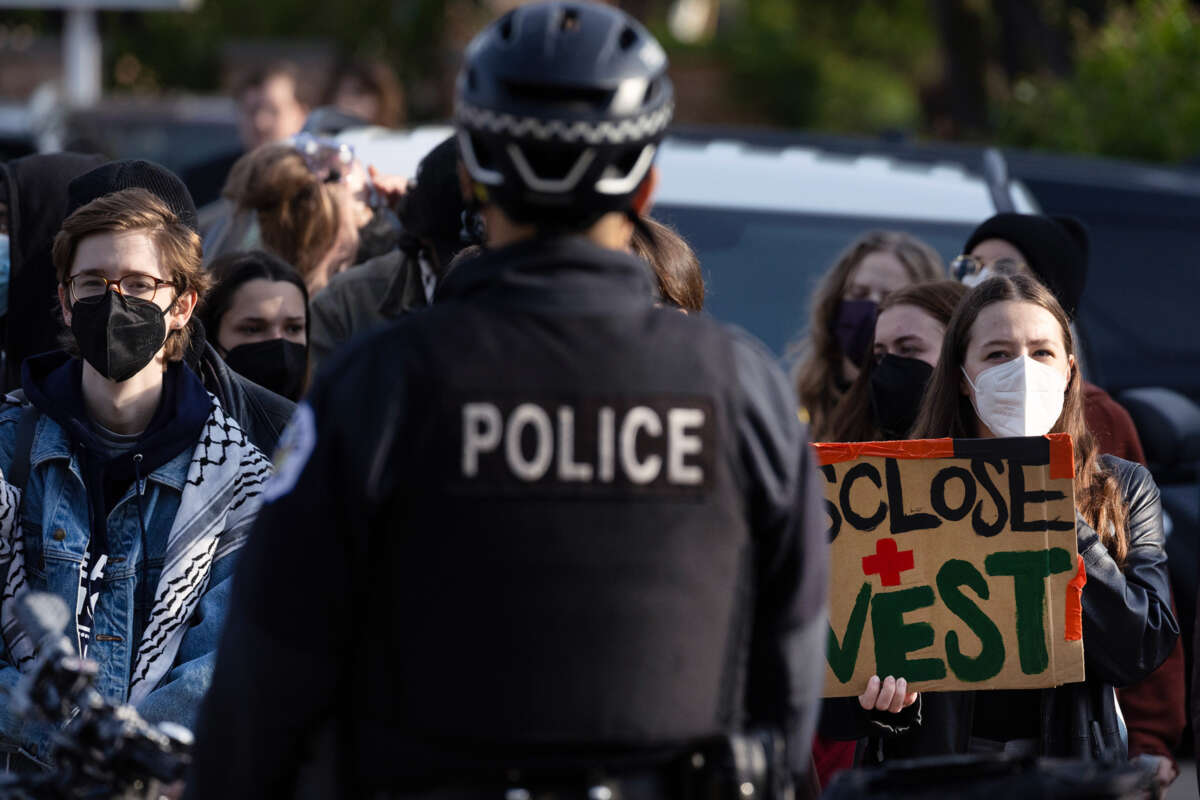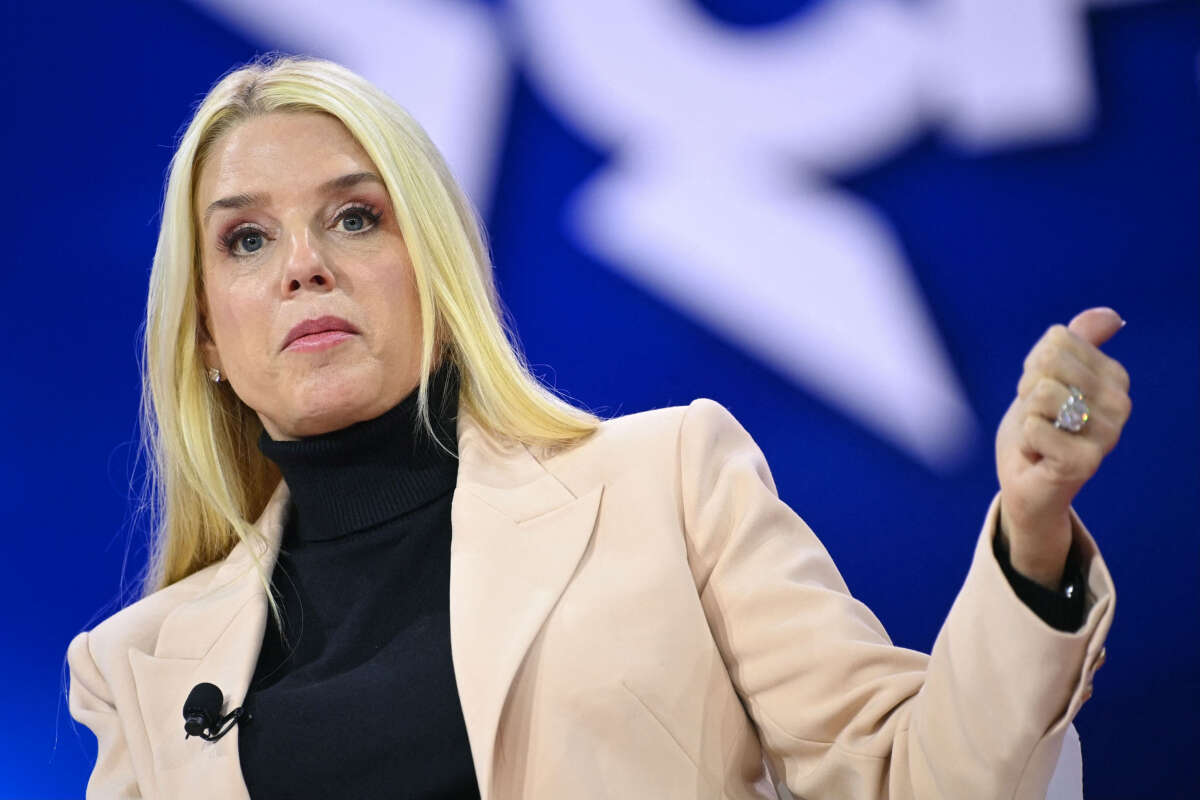The state's attorney is prosecuting University of Illinois Urbana-Champaign students over last April's encampments.
By Tara Goodarzi ,
November 25, 2024

Chicago police keep activists back as workers remove a pro-Palestine encampment on the campus of DePaul University on May 16, 2024, in Chicago, Illinois.
Scott Olson / Getty Images
Pre-trial hearings for students who participated in a Gaza solidarity encampment in central Illinois last spring are being held on November 20 and December 4, 2024. The outcome of the four students’ trials will determine whether they will risk up to three years of incarceration on felony “mob action” charges for having exercised their free speech rights on campus.
The students from the University of Illinois Urbana-Champaign (UIUC) — one of the largest public universities in the country — constructed an encampment known as the Popular University for Gaza in April 2024, after months of Israel’s relentless slaughter of Palestinians, mirroring dozens of other student-led sites across the United States.
The UIUC students’ demands were similar to those of their peers: an acknowledgement by the administration of Israel’s ongoing genocide of Palestinians, funded almost exclusively by the United States; a commitment to addressing Palestinian and Muslim affairs on campus; and divestment from all corporations and academic collaborations that support the Israeli occupation of Palestine.
Illinois student organizers, led in part by the group UIUC Students for Justice in Palestine, attempted to meet with university officials, such as Chancellor Robert Jones (who announced his decision to resign from the university just last week). The students tried to engage with administration over the course of several months, but meaningful negotiations never materialized. Students held demonstrations on campus and remained steadfast in their commitment to the encampment absent cooperation from the school. Citing violations of its student handbook policies relating to tents and signs on its quad, the university ushered in scores of police officers, spanning five different counties in central Illinois (and requiring over $137,000 in overtime). According to faculty eyewitnesses, students were encircled and threatened with arrest and misdemeanor charges if they failed to cease their demonstrations. The students eventually voluntarily disassembled the encampment. Two individuals were arrested, but neither were students. The issue appeared to be closed.
But it wasn’t closed. Over the summer months, UIUC police and Champaign County State’s Attorney Julia Rietz joined forces to send a clear and heavy-handed message about how they intend to handle pro-Palestinian student speech going forward. Rietz — who has been on the faculty of UIUC’s law school since 2009 — began issuing summonses starting in July 2024, to students who are alleged to have participated in the encampment. A great deal of effort and resources seemingly went into targeting these students: University police utilized surveillance technology, including the use of license plate readers, as well as students’ social media posts and body camera footage. And the resulting summonses were not for misdemeanors — they contained mandates to appear in court for Class Four felony mob action charges, which carry up to three years in prison. Several students were charged, including one Palestinian student.
Related Story
Pre-trial hearings for students who participated in a Gaza solidarity encampment in central Illinois last spring are being held on November 20 and December 4, 2024. The outcome of the four students’ trials will determine whether they will risk up to three years of incarceration on felony “mob action” charges for having exercised their free speech rights on campus.
The students from the University of Illinois Urbana-Champaign (UIUC) — one of the largest public universities in the country — constructed an encampment known as the Popular University for Gaza in April 2024, after months of Israel’s relentless slaughter of Palestinians, mirroring dozens of other student-led sites across the United States.
The UIUC students’ demands were similar to those of their peers: an acknowledgement by the administration of Israel’s ongoing genocide of Palestinians, funded almost exclusively by the United States; a commitment to addressing Palestinian and Muslim affairs on campus; and divestment from all corporations and academic collaborations that support the Israeli occupation of Palestine.
Illinois student organizers, led in part by the group UIUC Students for Justice in Palestine, attempted to meet with university officials, such as Chancellor Robert Jones (who announced his decision to resign from the university just last week). The students tried to engage with administration over the course of several months, but meaningful negotiations never materialized. Students held demonstrations on campus and remained steadfast in their commitment to the encampment absent cooperation from the school. Citing violations of its student handbook policies relating to tents and signs on its quad, the university ushered in scores of police officers, spanning five different counties in central Illinois (and requiring over $137,000 in overtime). According to faculty eyewitnesses, students were encircled and threatened with arrest and misdemeanor charges if they failed to cease their demonstrations. The students eventually voluntarily disassembled the encampment. Two individuals were arrested, but neither were students. The issue appeared to be closed.
But it wasn’t closed. Over the summer months, UIUC police and Champaign County State’s Attorney Julia Rietz joined forces to send a clear and heavy-handed message about how they intend to handle pro-Palestinian student speech going forward. Rietz — who has been on the faculty of UIUC’s law school since 2009 — began issuing summonses starting in July 2024, to students who are alleged to have participated in the encampment. A great deal of effort and resources seemingly went into targeting these students: University police utilized surveillance technology, including the use of license plate readers, as well as students’ social media posts and body camera footage. And the resulting summonses were not for misdemeanors — they contained mandates to appear in court for Class Four felony mob action charges, which carry up to three years in prison. Several students were charged, including one Palestinian student.
Related Story

Trump Tells Donors He’ll Deport “Any Student” Who Protests Against Gaza Genocide
Both US-born and foreign students have constitutionally recognized rights to free speech. By Chris Walker , Truthout May 28, 2024
On August 16, 2024, Rietz publicly stated during a local radio spot that these charges were pursued at the direct request of the university. However, the decision to prosecute these students for a felony under the mob action statute was ultimately a prosecutorial decision, despite Rietz’s public claims that free “speech is absolutely a protected right.” While Rietz was elected by the community to serve the best interests of Champaign County, her private affiliation with the university raises questions about the lens she is using to review the evidence of these cases. Some UIUC faculty fear that Rietz is advocating on behalf of the university first, instead of the county, and that the university is leveraging its connection with her to legitimize its mistreatment of students in the eyes of the public.
The latter concern is particularly relevant because Rietz and the university have moved forward with prosecuting students despite the fact that numerous alumni, employees and community activists have publicly urged them to stand down and respect constitutional rights. In July of 2024, 37 UIUC faculty sent an open letter to Rietz, calling for her to drop all charges against students. Many of these faculty members were present at the encampment and witnessed the peaceful actions of the students. In their letter, the faculty explained that many of the participating students have lost family members and were directly affected by Israel’s ongoing genocide in Gaza. They noted that the students’ actions exemplified those of global citizens trying to use their voices for a more just and peaceful world — one of the alleged goals of UIUC. Additionally, the University of Illinois Board of Trustees’ public board meetings recently have included speakers during public comment periods who have condemned the school’s actions towards these students.
The outcome of the four students’ trials will determine whether they will risk up to three years of incarceration on felony “mob action” charges for having exercised their free speech rights on campus.
Rietz and UIUC have chosen to take a more criminally aggressive approach to student concerns over genocide as compared to other Illinois universities. The ACLU of Illinois even spoke out against these charges, noting that they opposed creation of the mob action statute, IL720 ILCS 5/25-1, when it was first being considered by the Illinois General Assembly because of their fear that it would be used against protestors in this very way. In their statement, the ACLU explained that lawmakers expressed repeatedly that the mob action statute would not be used to target protesters.
The university’s participation in prosecuting its own students for having the courage to publicly denounce genocide is disturbing, but not surprising. The university has a history of supporting a pro-apartheid position. In 1986, after students bravely protested their campus’s investment in apartheid South Africa, the university ultimately was forced to divest millions. More recently, in 2013, the University hired renowned professor Steven Salaita, only to rescind his employment offer after reading his tweets denouncing the murderous acts of the Israeli apartheid state. In July and August of 2014, Israel murdered over 2,200 Palestinians, an assault to which Salaita rightly took great exception. After the school rescinded his employment offer, Salaita sued UIUC and earned a settlement award of over $800,000. Embarrassingly, UIUC also earned a formal censure from the American Association of University Professors for failure to adhere to principles of academic freedom.
The university also maintains a robust portfolio of pro-apartheid investments running upwards of $27 million for 2023 alone by some estimates. The alphabet soup of university agencies allegedly responsible for managing and directing these funds seems purposefully opaque: Inquiries into one entity about its spending only lead to finger pointing at another. Certain entities are public — subject to FOIA reveal — while others are private and cannot be easily scrutinized.
Protecting these investments seems paramount to the administration, and unfortunately, the university has not been content with criminal charges against these students alone. Apparently hell-bent on destroying this movement even further, UIUC recently decided that Students for Justice in Palestine will no longer be officially recognized as a legitimate, registered student organization on campus. Other universities such as Brown, Columbia, George Washington and Brandeis have similarly engaged in this type of suppression. Further still, according to numerous faculty members monitoring the situation on campus, UIUC is currently pursuing aggressive academic disciplinary measures against several of the criminally charged students, a procedure that prohibits students from speaking publicly about the process, and allows them limited access to guidance or representation. These students now face not only jail time, but the threat of expulsion as well. There continues to be widespread support for the students. In recent weeks, a flood of emails to university administrators has demanded that these disciplinary charges be dropped.
As of the date of this publication, Rietz and UIUC have still refused to state whether they are finished with their quest to charge and punish students from last spring. With an existing three-year statute of limitations for a mob action claim, students who were encampment participants must face another school year with a looming threat over their heads. Of course, the intended impact is clear: to curtail visible pro-Palestinian sentiment on campus. As the current round of Israeli violence in Gaza surpasses the one-year mark, UIUC has staked its position firmly out as one of the most threatening schools in the U.S. for students who are outwardly opposed to ethnic cleansing, apartheid and genocide.
University of Illinois Urbana-Champaign and Rietz’s office declined to comment.
Note: Readers who wish to make their voices heard to the UIUC administration on this issue can find contact information for administrators here.
Trump’s AG Pick Pam Bondi Once Called for Deporting Student Protesters
Pam Bondi’s call for deporting students — regardless of their citizenship status — echoes comments Trump made in May.
By Chris Walker ,
November 25, 2024

Florida's former Attorney General Pam Bondi speaks during the annual Conservative Political Action Conference meeting on February 23, 2024, in National Harbor, Maryland.
Mandel Ngan / AFP via Getty Images
Arecently unearthed interview featuring Pam Bondi, president-elect Donald Trump’s selection for U.S. Attorney General, showcases her support for deporting college students who protest against Israel’s genocide in Gaza.
Trump selected Bondi after his initial pick, former Republican congressman Matt Gaetz, withdrew his nomination for Attorney General following allegations of sexual misconduct.
Bondi’s comments, which were rediscovered last week, run counter to the freedoms and protections outlined in the First Amendment, which apply to both citizens and temporary residents in the U.S.
“The thing that’s really the most troubling to me [are] these students in universities in our country, whether they’re here as Americans or if they’re here on student visas, and they’re out there saying ‘I support Hamas,'” Bondi, a staunch supporter of Israel, told Newsmax last year, as students across the country were demanding that universities divest from Israel’s indiscriminate slaughter of Palestinians in Gaza.
Students who dared to exercise their speech and assembly rights to call for an end to the genocide should be punished, Bondi added.
Related Story
Arecently unearthed interview featuring Pam Bondi, president-elect Donald Trump’s selection for U.S. Attorney General, showcases her support for deporting college students who protest against Israel’s genocide in Gaza.
Trump selected Bondi after his initial pick, former Republican congressman Matt Gaetz, withdrew his nomination for Attorney General following allegations of sexual misconduct.
Bondi’s comments, which were rediscovered last week, run counter to the freedoms and protections outlined in the First Amendment, which apply to both citizens and temporary residents in the U.S.
“The thing that’s really the most troubling to me [are] these students in universities in our country, whether they’re here as Americans or if they’re here on student visas, and they’re out there saying ‘I support Hamas,'” Bondi, a staunch supporter of Israel, told Newsmax last year, as students across the country were demanding that universities divest from Israel’s indiscriminate slaughter of Palestinians in Gaza.
Students who dared to exercise their speech and assembly rights to call for an end to the genocide should be punished, Bondi added.
Related Story

Trump’s New AG Pick Lobbied for Corporate Giants and Financial Firms
Trump’s selection of Pam Bondi also prompted renewed scrutiny of her record as Florida’s former attorney general.
“Frankly they need to be taken out of our country,” Bondi said, “or the FBI needs to be interviewing them right away.”
Although Bondi’s comments contradict the Constitution, Trump will likely defend her statements if they come under scrutiny during her confirmation hearings, as he himself issued a call to deport student protesters during his presidential campaign.
“Any student that protests, I throw them out of the country,” Trump promised a group of donors in May.
Bondi, who previously served as Florida Attorney General, is considered far more qualified to run the Justice Department than Gaetz was. However, like Gaetz, her far right views indicate that she will likely use the department to go after Trump’s perceived political opponents.
In 2014, Bondi opposed marriage equality by using her office to argue against a lawsuit that sought to have Florida recognize same-sex marriages from other states. As state attorney general, Bondi tried to dismantle parts of the Affordable Care Act through lawsuits of her own, seeking to get federal courts to deem the law unconstitutional.
Bondi also took pro-Trump actions well before Trump ran for president: After initially deciding to join an investigation into Trump University in 2013, her office changed course days later, surreptitiously making the decision after a Trump charity donated $25,000 to her reelection campaign. In 2020, meanwhile, Bondi served on Trump’s legal team for his first impeachment trial, which dealt with the former president promising military aid to Ukraine if Ukrainian leaders agreed to find political dirt on Joe Biden. And she has also pushed Trump’s false claims that Biden only won the 2020 race due to widespread election fraud.
Notably, Bondi has repeatedly expressed a desire to go after Trump’s adversaries, advocating for those charging him with crimes to be charged themselves.
“The prosecutors will be prosecuted, the bad ones,” Bondi said in a Fox News interview last year. “The investigators will be investigated.”
Critics have called for the Senate to hold robust hearings on Bondi’s nomination, with many saying her statements should disqualify her from leading the Department of Justice.
“Bondi must be asked at her confirmation hearing if Trump lost the election in 2020,” former federal prosecutor and current University of Alabama law professor Joyce Vance said on Bluesky. “Unless her answer is yes, the Senate must reject her nomination. You can’t be an election denier & the attorney general.”
“It’s not just that Bondi could use her authority to aid Trump or that he thinks she will. It’s that she already has,” Washington Post columnist Philip Bump pointed out.
This article is licensed under Creative Commons (CC BY-NC-ND 4.0), and you are free to share and republish under the terms of the license.

Chris Walker is a news writer at Truthout, and is based out of Madison, Wisconsin. Focusing on both national and local topics since the early 2000s, he has produced thousands of articles analyzing the issues of the day and their impact on the American people. He can be found on most social media platforms under the handle @thatchriswalker.
No comments:
Post a Comment